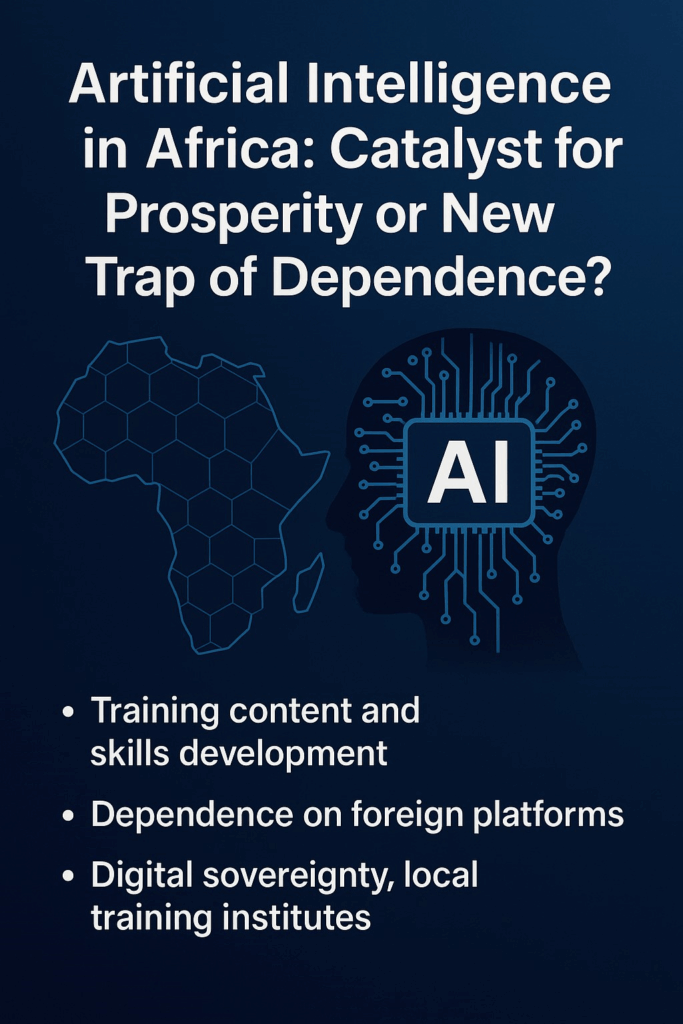Introduction: Africa at the Dawn of AI
The 21st century is marked by a silent yet powerful revolution: artificial intelligence (AI). Algorithms capable of learning, predicting, optimizing, and even creating are transforming every sector—from health to agriculture, from education to finance.
In advanced economies, AI is already an indispensable driver of productivity. But for Africa, the question is different: will the continent embrace AI as a training tool to build human capital and competitiveness, or will it become trapped in technological dependence on foreign powers?
This article explores how Africa can use AI not just for technology consumption but also as a catalyst for training, skills, and inclusive development.
The Global Context of Artificial Intelligence
AI is no longer a distant promise—it is a global industry worth over $500 billion, with growth rates exceeding 20% annually.
Its applications are everywhere:
- Chatbots for customer service.
- Predictive analysis in finance.
- Image recognition for medical diagnostics.
- Logistical optimization in transportation.
- Learning systems in education and professional training.
For Africa, AI offers not only technology adoption but also training opportunities to prepare millions of young people for the digital future.
Africa’s Strengths in Embracing AI for Training
Africa holds unique assets to integrate AI into training and skills development:
- A young, digital-savvy population – over 60% under the age of 25.
- Dynamic tech hubs – Lagos, Nairobi, Kigali, Dakar, and Cairo are innovation hotspots.
- Immediate need for training solutions – from agriculture to healthcare, skills gaps can be addressed with AI-powered platforms.
- A powerful diaspora – African experts trained abroad can return to strengthen local ecosystems.
Opportunities for Training Content through AI
a) Agriculture and Farmer Training
- AI-driven apps to train farmers on soil management, crop rotation, and pest control.
- Predictive weather platforms that provide training modules on adapting to climate change.
- Real-time decision support through mobile training systems.
b) Healthcare Training
- Training programs for medical staff using AI simulations.
- Virtual coaching for rural health workers.
- AI-based diagnostics integrated into continuous medical education.
c) Education & Professional Training
- Personalized e-learning platforms.
- Instant translation into local languages for inclusivity.
- AI tutors to assist teachers and trainers.
d) Financial Skills Training
- AI chatbots that teach financial literacy.
- Training entrepreneurs on risk management through predictive tools.
- Microfinance institutions using AI to train small businesses in digital payments.
e) Public Governance & Civic Training
- AI-powered platforms to train civil servants in transparency and digital management.
- Smart city models used as training environments for urban planning.
Risks of Technological Dependence
Relying on AI without local ownership presents dangers:
- Dependence on foreign platforms – training systems may be designed abroad and misaligned with African needs.
- Data colonization – sensitive African data (education, health, finance) may be exploited externally.
- Exclusion of vulnerable groups – without local adaptation, training may benefit only urban elites.
- Loss of cultural identity – if training content ignores African values and languages.
Strategies for Building AI-Driven Training Sovereignty
Africa must act decisively:
- Invest in training institutes – AI labs and digital universities in every region.
- Promote African datasets – build content libraries in local languages, contexts, and sectors.
- Develop clear public policies – data protection, training standards, and sovereignty laws.
- Empower the diaspora – encourage African experts to contribute training content locally.
- Forge local-global partnerships – combine external expertise with African realities.
Case Study: Cassava Training with AI
Cassava, a staple for millions, can benefit from AI-driven training:
- Farmers trained through AI apps to detect plant diseases.
- Predictive training modules for yield management.
- Virtual courses on cassava industrial transformation.
This convergence of AI and training content demonstrates how Africa can transform its resources through knowledge.
Conclusion: Training, Not Just Technology
For Africa, AI is not just about consuming advanced technology. It is about using AI as a tool to train its population, build skills, and achieve sovereignty.
- With investment and innovation, AI-driven training can become a driver of prosperity.
- Without ownership, it risks being a trap of dependence.
AI is not just about machines. It is about people—and how well Africa can prepare its people for the future.
✍️
Augustin Kazadi-Cilumbayi
President & CEO
Eyano Publishing
📧 contact@eyanoexpress.com
📞 US/Canada: +1 800 955 0153 | International: +1 613 882 0555
🌐 www.eyanoexpress.com
